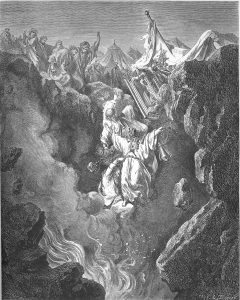In the Jewish literature, what Korah and his company did is not considered as a ‘rebellion’ but rather as ‘Machloket’ {מחלוקת} – Hebrew for an ‘argument’ or ‘dispute.’ The Hebrew root of the word ‘Machloket’ is H-L-K {ח-ל-ק} which means a ‘part.’
It seems like the Hebrew term for ‘argument’ or ‘dispute’ is NEUTRAL and only implies that there are two (or more) parts/sides in this act.

In order to better understand this Hebrew concept, one should have a look
at the ‘Mishnah’ {משנה} – the main codex of the Jewish law and customs from the 3rd century CE. In the Mishnah, one will find a very interesting discussion about the nature of the dispute:
“Any dispute that is for the sake of Heaven is destined to endure; one that is not for the sake of Heaven is not destined to endure. Which is a dispute that is for the sake of Heaven? The dispute(s) between Hillel and Shamai. Which is a dispute that is not for the sake of Heaven? The dispute of Korach and all his company.” (Mishnah, Avot 5:17)
The Mishnah teaches us that there are two kinds of ‘disputes’: a positive one (‘for the sake of heaven’) and a negative one (‘not for the sake of heaven’).
The first kind, the positive, is a dispute which is done for a good cause and born from good intentions, such as to fully consider different opinions before making a serious decision. Additionally, all sides should keep the rules and behave politely towards each other. Or in other words, in our modern world, we would call it a ‘debate’ or simply a ‘discussion.’ If the positive ‘dispute’ is actually a constructive discussion conversely the negative side will be a dispute JUST for the sake of the dispute. Also, when there is no respect between the different sides it is a negative dispute. Hillel and Shamai {הלל ושמאי} were two well-known Jewish rabbis and leaders (lived in the 1st century BCE) and their ‘disputes’ were positive because they were constructive discussions which led to creating a better reality for the people. Both are consider as key figures in the history of the development of the Jewish law and way of conduct.
Korah and his company, on the other hand, were chosen to use as the negative example for a ‘dispute’ because it is crystal clear that they (Korah and his company) did not have pure intentions and did not care for the people. In fact, they disguised their bad intentions and presented themselves as the ‘public defenders’ against the ‘self-proclaimed’ leaders Moses and Aaron so they could gain more power, and this is clearly ‘a dispute that is not for the sake of Heaven’.
